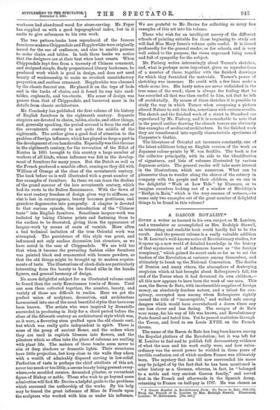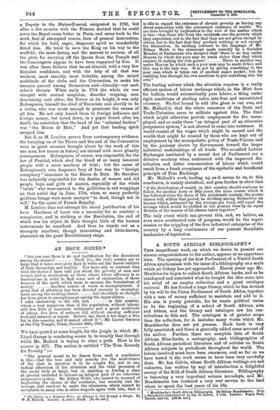A GASCON ROYALIST.*
GrvErt a writer so learned in his own subject as M. Lenotre, and a translator so accomplished as Mrs. Rodolph Stamen, an interesting and readable book could hardly fail to be the result. And the present volume is a really valuable addition to M. Lenotre's well-known series of Revolutionary studies, for it opens up a new world of detailed knowledge in the history of that mysterious set of influences known as "the foreign' conspiracy," which gained its secret ends so far as to set the leaders of the Revolution at variance among themselves, and ultimately to break up the National Convention. The deaths of Denton and many others, the atmosphere of destroying suspicion which at last brought about Robespierre's fall, the end of the Terror when it had devoured its own children,— all this now appears to have been the work of one man. This man, the Baron de Betz, with inexhaustible supplies of foreign money, an absolutely fearless nature, and a talent for con- spiracy, corrupted men among whom Robespierre rightly earned the title of "incorruptible," and walked safe among dangers which would have overwhelmed a dozen times any one less clever and less daring. The escapes of de Bats were many, for his way of life was known, and Revolutionary Paris feared and hated him. Yet he passed scatheless through the Terror, and lived to see Louis XVLIL on the French throne.
The name of the Baron de Bats has long been known among the Royalist plotters of the Revolution; but it was left for M. LenOtre to find and to publish full documentary evidence of what the man and his work really were, and how extra- ordinary was the secret power he wielded in those years of terrible confusion out of which modern France was ultimately born. The mystery that has till now surrounded his name may be judged of by the fact that he has been mentioned in sober history as a German, whereas, in fact, he "belonged to a noble and very ancient Gaseon family," and served first in the French and afterwards in the Spanish Army, returning to France on half-pay in 1787. He was chosen as • A Gascon Royalist in Revolutionary Peri s : the Baron do Date, /799-1705„ From the French of G. Lenotre by Mrs. Bodolph Stowell. Illustrated. London : W. Heinemann. [10s. not.]
a Deputy to the States-General, emigrated in 1792, but after a few months with the Princes, decided that he could serve the Royal cause better in Paris, and came back to the work, first of attempted rescue, then of general destruction, for which his bold, eager, desperate spirit so wonderfully fitted him. He tried to save the King on his way to the scaffold ; the most daring, and the nearest to success, of all the plots for carrying off the Queen from the Temple and the Conciergerie appear to have been organised by him. It was after these failures that he set himself, with a very few Royalist confidants, and with the help of all that was weakest, most rascally, most bribable, among the mixed multitude of the clubs and the Convention, to make Isis enemies quarrel among themselves and—literally—cut each other's throats. When early in 1794 the whole air was charged with mutual suspicion, disorder reigning, men denouncing each other, the Terror at its height, it was only Robespierre, himself the chief of Terrorists and shortly to be a victim, who was acute enough to penetrate the causes of all this. He not only traced them to foreign influence and foreign money, but noted down, in a paper found after his death, his conviction that the head of the "criminal faction" was "the Baron de Batz." And yet that leading spirit escaped him.
But if, as M. Lenotre proves from contemporary evidence, the hurrying on of the Terror and the end of the Convention were in great measure brought about by the work of this one man, few names in history are stained with more ghastly consequences. Robespierre, of course, was responsible for the law of Prairial, which shed the blood of so many innocent people with a mere mockery of trial; but the cause of Robespierre's own desperate fury of fear was the "foreign conspiracy" incarnate in the Baron de Betz. He therefore was indirectly responsible for the deaths of women and old people, boys and girls of sixteen, especially of the whole "batch" who were carried to the guillotine in red wrappings on that awful day in June, 1794, when so many perfectly guiltless beings were made martyrs "in deed, though not in will," for the cause of French Royalty.
M. Len6tre does not attempt the moral justification of his hero. Hardness of heart was a necessity for so resolute a conspirator, and in striking at the Revolution, the end of which was his object, de Batz thought little of the human instruments he sacrificed. And thus he stands out as a strangely repellent, though interesting and little-known, character on the great Revolutionary stage.











































































 Previous page
Previous page